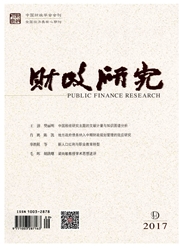

 中文摘要:
中文摘要:
为了满足低收入者的基本住房需求,政府可以为其提供公租房。从经济学上来讲,公租房是政府提供给低收入者的一种实物社会转移。出于激励相容原理,为了有效区分公租房市场与商品房市场,公租房应该具有"保基本"的特点,以使得有支付能力的家庭自动选择进入商品房市场。公租房的产权属于国家,租户仅具有暂时的使用权,而无处置权;国家可以对公租房建设给予土地和税收优惠,经过合理的制度设计,完全可以实现公租房项目的可持续运营。鉴于公租房项目的公益性与可持续性,政府可以发行专项债券募集资金用于项目建设;房地产市场库存较高的形势下,回购一定的库存房产用于公租房项目有助于化解房地产市场供求失衡,但要注意公租房供给结构与需求结构的匹配。
 英文摘要:
英文摘要:
In order to meet the basic housing needs of low-income people, the government can provlae public rental housing. From an economic point of view, public rental housing is provided by the government to low-income people as a social transfer in kind. In order to effectively distinguish between the public rental housing market and the commercial housing market, the public rental housing should have the characteristics of guaranteeing the basic need, so as to make the family with the ability to pay automatically choose to enter the commercial housing market. Since public rental property belongs to the state, the tenant has only a temporary right to use, without the disposal right. The government can grant land and tax concessions to public rental housing projects. With a reasonable system design, it can fully realize the sustainable operation of public rental projects. Due to the public welfare and sustainability, the government can issue special bonds to raise funds for public rental housing construction. As the real estate inventory expanded, buying a certain stock of real estate for public rental housing projects will help resolve the imbalance between supply and demand in the real estate market, but the match of the supply structure and demand structure of public rental housing should be considered.
 同期刊论文项目
同期刊论文项目
 同项目期刊论文
同项目期刊论文
 期刊信息
期刊信息
